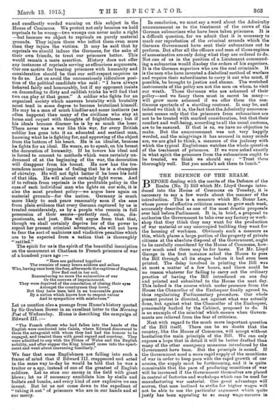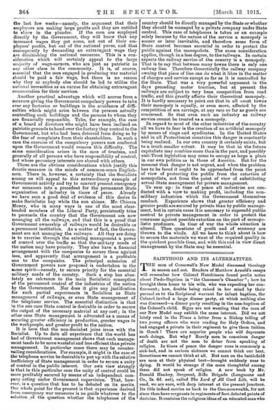THE DEFENCE OF THE REALM.
BEFORE dealing with the merits of the Defence of the Realm (No. 2) Bill which Mr. Lloyd George intro- duced into the House of Commons on Tuesday, it is necessary to say a few words about the manner of the introduction. This is a measure which Mr. Boner Law, whose power of effective criticism seems to grow each week, accurately described as one of the most drastic proposal. ever laid before Parliament. It is, in brief, a proposal to authorize the Government to take over any factory or work- shop that they think they may want for the production of war material or any unoccupied building they want for the housing of workmen. Obviously such a measure as this, which places a large portion of the property of private citizens at the absolute disposal of the Government. ought to be carefully considered by the House of Commons, how- ever much need there may be for haste. Yet Mr. Lloyd George in the first instance asked the House to pass the Bill through all its stages before it had even been printed. The delay involved in printing the Bill was at most a matter of a few hours, and there could be no reason whatever for failing to carry out the ordinary practice of having the Bill introduced on one day and printed and submitted to the House the next day. This indeed is the course which under pressure from the House the Chancellor of the Exchequer finally agreed to, thus regularizing Parliamentary procedure. Our whole present protest is directed, not against what was actually done, but against what the Chancellor of the Exchequer. presumably backed by the Cabinet, proposed to do. It is an example of the mischief which ensues when Govern- ments are relieved from the fear of criticism.
Next with regard to the much more important question of the Bill itself. There can be no doubt that the country, like the House of Commons, will accept without hesitation the main principle of the Bill. We can only express a hope that in detail it will be better drafted than many of the other emergency measures introduced by the Government have boon. But the principle is sound. If the Government need a more rapid supply of the munitions of war in order to keep pace with the rapid growth of our armies, the supply must be forthcoming, and it is quite conceivable that the pace of producing munitions of war will be increased if the Government themselves are placed in control of factories and workshops which can be used for manufacturing war material. One great advantage will accrue, that men inclined to strike for higher wages will not be able to use the particular argument which quite justly has been appealing to so many wage-earners in
the last few weeks—namely, the argument that their employers are making large profits and they are entitled to share in the plunder. If the men are employed directly by the Government, they will know that any increased wages they got come, not out of their em- ployers' profits, but out of the national purse, and that consequently by demanding an extravagant wage they aro diminishing the national resources. This is a con- sideration which will certainly appeal to the large majority of wage-earners, who are just as patriotic as any other class in the community. It is, of course, essential that the men engaged in producing war material should be paid a fair wage, but there is no reason why they or anybody else should be led to utilize the national necessities as an excuse for obtaining extravagant remuneration for their services.
Another practical advantage which will accrue from a measure giving the Government compulsory powers to take over any factories or buildings is the avoidance of diffi- culties which might arise between the persons actually controlling such buildings and the persons to whom they are financially responsible. Take, for example, the case of a board of directors who might have been inclined on patriotic grounds to band over the factory they control to the Government, but who had been deterred from doing so by the fear of complaints from their shareholders. In such a case the exercise of the compulsory powers now conferred upon the Government would remove this difficulty. The same consideration arises in the case of trustees, and generally of all persons who have responsibility of control, but whose pecuniary interests are shared with others. These are the obvious considerations which justify this drastic measure in the minds of common-sense English- men. There is, however, a certainty that the Socialists among us will appeal to this extraordinary example of Government activity and try to convert present emergency war measures into a precedent for the permanent State organization of industry in times of peace. Already we have seen a good deal of evidence of this desire to make Socialistic bay while the sun shines. Mr. Chiozza Money, who in many ways is one of the most clear- headed members of the Liberal Party, persistently tries to persuade the country that the Government are now managing all the railways, and that this is a proof that Government ownership of railways would be desirable as a permanent institution. As a matter of fact, the Govern- ment are not managing the railways. All they are doing is to exercise through the existing management a power of control over the traffic so that the military needs of the nation may have priority. They also have a financial arrangement with the companies to secure them against loss, and apparently that arrangement is a profitable one to the companies. The principal extension of Government powers now proposed is undertaken in the same spirit—namely, to secure priority for the essential military needs of the country. Such a step has abso- lutely no relevance to the main Socialistic conception of the permanent control of the industries of the nation by the Government. Nor does it give any justification for such partial experiments in Socialism as State management of railways, or even State management of the telephone service. The essential distinction is that in the one case State control is desirable in order to secure the output of the necessary material at any cost; in the other case State management is advocated as a means of securing greater efficiency in production, greater wages to the workpeople, and greater profit to the nation. It is here that the non-Socialist joins issue with the Socialist. Up to date all experience that the world has had of Government management shows that such manage. naent tends to be more wasteful and less efficient than private management. In particular cases there may be counter- vailing considerations. Por example, it might in the case of the telephone service be desirable to put up with the relative inefficiency of State management in order to secure a unity of control in the public interest. Our own view strongly is that in this particular case the unity of control could be more profitably secured by means of an independent com- pany acting under Government supervision. That, how- ever, is a question that has to be debated on its merits. Our whole point for the present is that experience derived from emergency war measures is no guide whatever to the solution of the question whether the telephones of the country should be directly managed by the State or whether they should be managed by a private company under State control. This case of telephones is taken as an example solely because by the nature of the service a monopoly is sooner or later inevitable, and therefore some form of State control becomes essential in order to protect the public against the monopolists. The same consideration applies, though in a less degree, to the railways. In certain aspects the railway service of the country is a monopoly. That is to say that between many towns there is only one railway line. Therefore theoretically the railway company owning that piece of line can do what it likes in the matter of charges and service except so far as it is controlled by the State. That was a very powerful argument iii the days preceding motor traction, but at present the railways are subject to very keen competition from road traffic, and this greatly affects their theoretical monopoly. It is hardly necessary to point out that in all coast towns their monopoly is equally, or even more, affected by the competition of sea carriage, at any rate so far as goods are concerned. So that even such an industry as railway service cannot be treated as a monopoly.
In regard to most of the other industries of the country all we have to fear is the creation of an artificial monopoly by means of rings and syndicates. In the United States and in all Protectionist countries this danger is constantly being realized, in our own country it certainly exists, bat to a much smaller extent. It may be that in the future capitalists may combine more than in the past, and possibly anti-Trust legislation may come to occupy as large a place in our own politics as in those of America. But for the moment that danger is not urgent, and when the problem has to be faced it ought to be approached from the point of view of protecting the public from the extortion of monopolists, not from the point of view of substituting actual State management for private management.
To sum up in time of peace all industries are con- ducted with a view to making profit, including the non- military industries which the Government themselves conduct. Experience shows that greater efficiency and greater profit are secured by private than by public manage- ment, but in certain cages it is necessary to superadd public control to private management in order to protect the consumer against possible extortion on the part of monopo- listic producers. In time of war the whole situation is altered. Then questions of profit and of economy are thrown to the winds. All we have to think about is how to secure the materials we want of the required quality in the quickest possible time, and with this end in view direct management by the State may be essential.



































 Previous page
Previous page